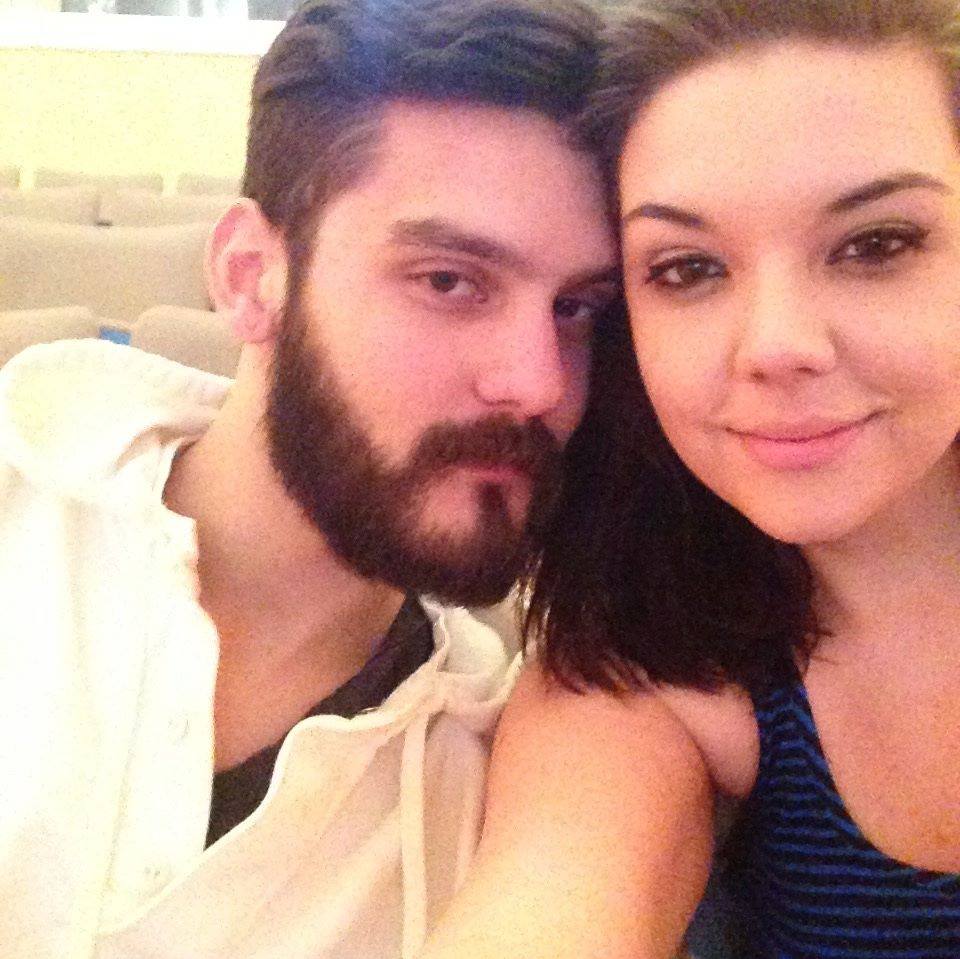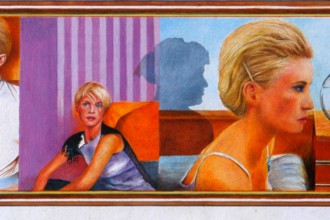The latest instalment of our Spotlight series brings together two young American poets: Alexis Groulx is currently studying at Vermont College of Fine Arts and has been published in a wide array of magazines, while Domenic Scopa’s first collection is forthcoming in 2017. Domenic is a three-time Pushcart Prize nominee and an adjunct professor for the Changing Lives Through Literature program at the University of Massachusetts and at New Hampshire Technical Institute. He is also Alexis’ partner, and the two are often each other’s editors and first readers. The conversation that follows is primarily an exchange between Alexis and Domenic, prompted by questions from The Missing Slate. It touches on the advantages (and disadvantages) of living and writing with another poet, the difficulties of writing political poetry, and how it feels to be a young writer in the early years of the 21st-century.
Do you think that it’s any easier to be a young poet in the 2010s than it would have been at an earlier time in history? Has the proliferation of internet journals and writing courses/workshops made it simpler for new voices to be heard?
Alexis: I think there’s this idea that anyone can write a poem, which is true, but the real difficulty in being a young poet right now is that it requires much more work than people think. There is no formula for what makes a “poetâ€, but I think with the vastness of the internet we’re able to have words at the tips of our thumbs at any moment. This is great in many ways, being able to share work so easily and accessibly, but I think, too, there is real danger in how freely anyone can write up a draft of something and hit post. Of course, it’s difficult to be an artist of any kind. Spilling yourself into a piece of work that will be in the world for anyone to read is often terrifying, but the real elbow grease of it is what makes it difficult. The constant drafting, editing and obsessing over even just one word, or the way one line breaks. For us, the poet, it can seem our entire lives up to this point depend on getting it right, and when we finally feel it’s ready, and we send it off, get it published, and see it in print, we usually realize we made the wrong call and should have changed just one more thing. It’s a tireless thing, with little reward, but a great one.
Domenic: Yes, there are undoubtedly negatives to technology and its relationship to poetry nowadays, but I think that the contemporary ubiquity of online poetry has also facilitated a space for some really competent poets to thrive. I’m thinking especially of eclectic hybrid poets whose work would otherwise be nearly inaccessible in the mainstream, or poets that highlight the importance of intently listening to their words, such as Jamaal May. Oftentimes, the text of his poems is accompanied by an audio recording of him reading them, which offers a wonderful perspective on how he interprets the sounds of his own poems. Another hybrid poet that, I think, benefits from technology is Jen Bervin. She just released a video project where she announced that her poems will be engraved on silk. She then explained that silk is one of the only materials that can be implanted into the body without any adverse effects. So, in theory, people can implant these “silk-poems,†mimicking a tattoo’s effect.
However, technology has also exponentially accelerated the growth of the “slush-pile.†Like anything, there are positives and negatives. The proliferation of accessible writing programs, and their dissemination via the internet, certainly cultivates great new voices.
If you were able to write poetry at any point in history, would you choose to write now?
Alexis: Yes, because no matter the time period, I would still be producing similar poems. What’s important to me as a poet is emotional vulnerability, which is, really, just dependent on the speaker. So I don’t think it would make much of a difference. But especially considering where we are in the world right now, it doesn’t seem that we have progressed very far in history. Watching the news for even a few minutes can be nauseating. I think we are hyper-aware of how frightening the world is now, because information is easily accessible.
Domenic: But don’t you think that if you were writing in, say, the 40s, the emotional vulnerability would be drastically different?
Alexis: I don’t think so, because, as a woman writing then, I would still have the same emotional vulnerability, because the same conflicts or traumas would still be present. There’s no point in history greater or worse than the present. People are still born, people still die, people still get their heart broken, and everything in between.
Domenic: Well, I should clarify. I guess I didn’t mean that the emotional vulnerability would be drastically different, but rather the expression of that emotional vulnerability as it pertains to poetry. Don’t you think you would be less inclined to actually publish poems that depict that emotionally vulnerability given the societal mores? It’s all retrospection, and therefore, sort of unanswerable, so I apologize. But what’s your gut-reaction?
Alexis: I just think that you don’t have to disguise it as much now. People are much more cognizant. There’s this veil in poetry, metaphor and image, but really the heart of it is staring you in the face. What time period would you write in?
Domenic: The 1940s or 50s, haha. The titans of the pre-confessional and confessional movements still haunt me, and the temptation to write alongside them is far too appealing.
Alexis: Well, that’s because you have a man-crush on Robert Lowell.
Domenic: True.
What are the advantages (and disadvantages) of having a partner who also writes poetry?
Alexis: It’s nice to be with a likeminded person, and it’s nice to be able to buy only one copy of a book. But seriously, there’s something refreshing about not being the only one on the life-raft. A pro/con is sending to the same journal on the same day, and also getting dual rejections on the same day. It’s nice to not be alone in that respect. But, it’s definitely difficult to be with someone who is so driven, because sometimes all I want to do is watch movies all day, which I can’t do without feeling guilty, because Domenic is sitting next to me with his nose in a book.
Domenic: Well, I’ll have you know that she is lying about only buying one copy of a book, because she insists on leaving her margin notes first and I like to leave my margin notes first, so in reality it’s a race to see who reads and annotates the first copy of each book and who is left to purchase the second copy. And that sensation of guilty swings both ways, because when she is watching movies all day I feel a semblance of guilt for not being able to loosen up and relax. I think she does a wonderful job reminding me to take a deep breath sometimes. For example, my book manuscript was just recently accepted for publication and I have until December or something — I should probably know the official date to submit my final edits and blurbs — and I was neurotically editing twenty pages a night the week after I was notified, until Alexis advised me to give it some space. She said that I was over-editing. Little reminders like that are irreplaceable.
Are you always the first readers of each other’s work?
Alexis: If anybody reads it, it’s Domenic. 90% of it goes directly to the wastebasket.
Domenic: She’s lying, again. 90% of her work goes into the ‘new work’ folder on her laptop, where it lies fallow for months, until she summons the courage to show me.
Alexis: To be fair, I’m not lying. The ‘new work’ folder is just the computer-desktop version of a wastebasket. Occasionally, one or two will crawl out of that. It’s where bad poems go to die.
Domenic: I thought that the computer desktop version of that was just called “trash.†Seriously though, if she thought 90% of her work was trash, she would just drag it there. I think something significant defines the fact that she has a special folder for it. That folder is like one of those battery charging stations. The poems are just charging there, waiting to be accessed, leagues away from “trash.†Alexis is always my first reader, and, many times, the only reader. I usually show her poems immediately after I write them, sometimes with chagrin, and she imparts her initial reactions, which, oftentimes, helps tremendously. I think it’s immensely valuable to have readers, but I think that I need to make a distinction here. Alexis is not only my first reader, but also my editor.
Alexis: Ditto. It’s hard to find a good reader/editor, because, as well all know, work is typically very personal, and it takes a great deal of trust to find a good one.





